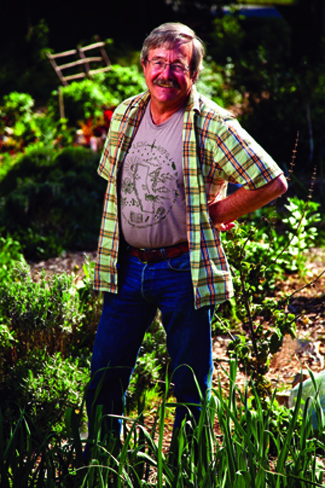Editor's note: The article below was originally published in the Fall 2007 issue of the UC Santa Cruz Review. You can view the original at:
http://review.ucsc.edu/fall07/Rev_F07_pp12-13_BreakingNewGround.pdf.

Stephen Gliessman is the founding director of the agroecology program at UC Santa Cruz.
Long before Wal-Mart began selling organic food, a charismatic Englishman and a group of students transformed a brush-covered hillside across from UC Santa Cruz’s Stevenson College into a lush garden where vegetables and flowers were grown without chemical pesticides or synthetic fertilizers.
Alan Chadwick, a master gardener, introduced an earth-friendly method of gardening that took hold on campus as surely as the roots of the heirloom vegetables, fruits, and flowers he planted. Since those pioneering days in 1967, UCSC has emerged as the “Harvard of organic farming.”
“We are small but mighty—an incubator for innovation,” said Sheldon Kamieniecki, dean of the Division of Social Sciences at UCSC. “Our influence proves you don’t have to be a big ag school to have major impacts on farming and food distribution.”
Considered by many the birthplace of organic farming, UCSC has transformed the way food is grown and helped make “sustainability” a household word. This year marks the campus’s 40th year at the forefront of sustainable agriculture. The hillside where it all began is now the Alan Chadwick Garden, an outdoor classroom that—with the 25-acre certified-organic UCSC Farm near the base of campus—comprises the key research and instructional facilities for the UCSC Center for Agroecology and Sustainable Food Systems (CASFS).
Apprenticeship in Ecological Horticulture
Established in 1971 to build on Chadwick’s legacy of providing hands-on training in organic farming and gardening, the six-month residential Apprenticeship in Ecological Horticulture regularly attracts students from as far away as Africa and Asia. More than 1,200 people have completed the first-of-its-kind program, and graduates have spread their knowledge and expertise around the globe.
In 1980, the campus established the Agroecology Program to formalize the study of the environment and agricultural systems, building on the apprenticeship’s hands-on program to create research and undergraduate educational opportunities. The program was headed by environmental studies professor Stephen Gliessman who, two years later, was named to the campus’s first endowed chair, the Alfred E. Heller Chair in agroecology.
Throughout the 1980s and 1990s, agroecology researchers collaborated with farmers to pioneer the organic production of several key crops widely considered impossible to grow without synthetic inputs: strawberries, apples, artichokes, and cotton.
“When skeptics said, ‘You can’t grow strawberries without fungicide,’ our researchers teamed up with farmers and said, ‘Let’s figure this out,’” recalls CASFS director Patricia Allen. Working with Jim Cochran of Swanton Berry Farm in northern Santa Cruz County, CASFS entomologist Sean Swezey introduced the use of predatory mites, and researchers experimented with compost and crop rotations until they found the right balance.
Organic strawberries
“Their success helped make organic strawberries widely available,” said Allen. That innovative fieldwork was matched by Allen’s scholarship, which pushed the agenda of sustainability beyond ecological stewardship to address issues of social justice in the food system, such as the rights of workers to fair wages, decent working conditions, and access to healthful food. UCSC’s leadership both in the field and in the literature was solidified by Gliessman’s publication of the first college textbook in agroecology and two books by Allen, including her most recent, Together at the Table, which documented the scope of the alternative food movement and its impacts at the forefront of social change.
Today, CASFS continues to collaborate with growers, and researchers are monitoring the emergence of alternatives that offer new hope to many smaller farmers by cutting out the “middle man,” such as farmers’ markets, community-supported agriculture programs (CSAs),and farm-to-institution partner-ships. UCSC faculty are weighing in on the hottest debates ofthe day, from genetically modified crops to fair-trade principles and tension over “local versusorganic” production. In 2004,CASFS affiliate Julie Guthman, an assistant professor of com-munity studies, published the first comprehensive study of organic farming in California.
Embraced by students
“UCSC is continuing to shape the agenda,” says Allen. Students have embraced sustainability from the earliest days when they worked at Chadwick’s side. In recent years, students pioneered a farm-to-cafeteria program that provides fresh, campus-grown organic produce to dining halls, and they are leading the effort to bring similar changes to campuses throughout the UC system. They also worked with administrators to introduce fair-trade organic coffee across campus and have helped UCSC Dining Services minimize its “environmental footprint” by reducing food waste, recycling used cooking oil, and contracting with a local food-distribution company. In addition, the UCSC Food Systems Working Group has emerged as a leader of the national movement that is lobbying schools, colleges, and other institutions to buy fresh food from local farmers.
Sustainability programs spread
A final compelling measure of UCSC’s impact is the development of sustainable agriculture programs at major universities across the country. “Sustainability is at the core of the curriculum now, and even the most established ag schools are building programs,” says Allen. “It’s pretty gratifying, because they’re quick to acknowledge that a lot of what they’re doing now began at UCSC.”
And so, 40 years after it all began, UCSC sits at the head of the table where the nation’s food debate is taking place.
“UCSC has been ahead of the curve for 40 years,” says Allen. “I expect that’s where we’ll be 40 years from now.”
For more information about the Center for Agroecology and Sustainable Food Systems, visit http://casfs.ucsc.edu.


